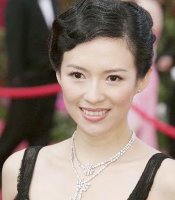

"Interracial couples have the most beautiful babies.” As conventional wisdom, this may not be entirely true, but stars like Michele Reis, Christy Cheung, and Takeshi Kaneshiro – known as hunxue in Chinese – make a convincing case.
What about Daniel Wu? In a recent issue of Sanlian Life Week, Meng Jing pointed to a mixed Chinese-Western heritage in an attempt to explain Wu’s failure to graduate from supporting roles, like his turn as a prince in this season’s The Banquet:
Strictly following Shakespeare’s original, Wu’s prince would be a standard leading role, if only the director had not changed the play. But of course the director changed the play. Were the role played by Tony Leung then maybe it would have retained its original dimensions, but few directors are comfortable with having Daniel Wu support the entire thing. Wu’s been in the business for a while. Every year he’s the top “women’s sex fantasy partner.” He’s not been short of opportunities, either, but those opportunities weren’t enough to let him take off his “pretty-boy” hat. Why can’t an actor who has opportunity, looks, and strength make it to the next level? The reason: he is mixed-race and grew up in San Francisco.
Unfortunately for this theory, Daniel Wu was born in the US in 1974, and his parents are both from Shanghai. Meng continues:
There are lots of actors who have returned from overseas whose status as ABCs doesn’t prevent them from succeeding; instead, it acts as a sort of talent reservoir – they are more open, more skilled at language than mainland actors. But those actors aren’t mixed-race; most of them are bananas: yellow shells around white cores. Lee-Hom and Coco Lee are both successful examples – they grew up outside the country, but their faces are still Chinese. Or Christy Chung – she’s a mix of Asian blood. Chinese, Vietnamese, and Japanese are all okay, but once you leave the realm of the yellow race, you’ve got problems.
Meng may have a point when she suggests that many ABCs, returned expats, and mixed-race Asian celebrities share some “foreign” quality that distances them from domestic audiences. And though Wu may be ethnically Chinese, there’s something about him that leads fans, from online forum commenters to a well-known gossip columnist, to identify him as hunxue.
Taken in this way, hunxue may be more of a behavioral and aesthetic concept than a genealogical identity. Despite their mixed Sino-European ancestry, superstars like Karen Mok and Cecilia Cheung are rarely thought of as “foreign” in the way that Meng has pegged Daniel Wu. So with a bloodtest unreliable, the fate of new stars remains uncertain: will Isabella Leong, the Sino-Portuguese breakout star of this spring’s Isabella follow in their footsteps, or will she be trapped in the just-a-pretty-face ghetto with Wu and other cultural hunxue celebrities? Joel Martinsen

No comments:
Post a Comment